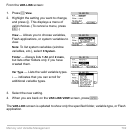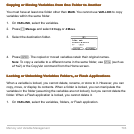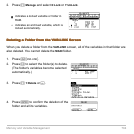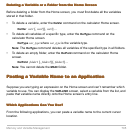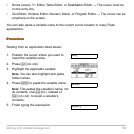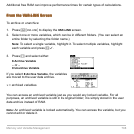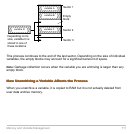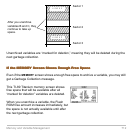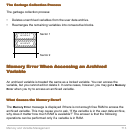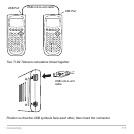
Memory and Variable Management 710
Why not Perform Garbage Collection Automatically, without a
Why not Perform Garbage Collection Automatically, without a Why not Perform Garbage Collection Automatically, without a
Why not Perform Garbage Collection Automatically, without a
Message?
Message?Message?
Message?
The message:
• Lets you know why an archive will take longer than usual. It also alerts you that the
archive may fail if there is not enough memory.
• Can alert you when a program is caught in a loop that repetitively fills the user data
archive. Cancel the archive and investigate the reason.
Why Is Garbage Collection Necessary?
Why Is Garbage Collection Necessary?Why Is Garbage Collection Necessary?
Why Is Garbage Collection Necessary?
The user data archive is divided into sectors. When you first begin archiving, variables
are stored consecutively in sector 1. This continues to the end of the sector. If there is
not enough space left in the sector, the next variable is stored at the beginning of the
next sector. Typically, this leaves an empty block at the end of the previous sector.
Each variable that you archive is stored in the first empty block large enough to hold it.
Note: An archived variable is stored in a continuous block within a single sector; it cannot
cross a sector boundary.



